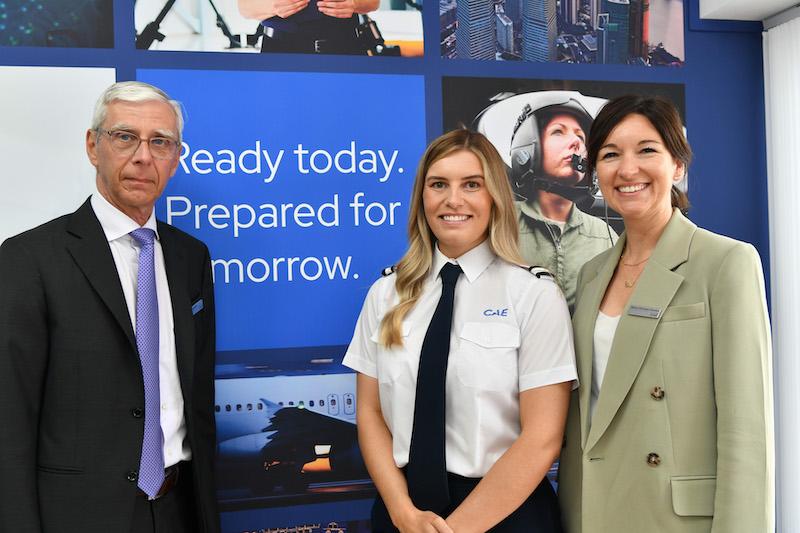
From left to right: Nick Leontidis, CAE’s chief operating officer; Elle Betchley, CAE’s new Women in Flight Ambassador; and Marie-Christine Cloutier, CAE’s vice-president, performance, strategy and marketing.
An often-heard objection to becoming a pilot, for women, centers around taking care of a family when you have a variable work schedule. Apparently, that argument does not apply to flight attendants. Fighting that inconsistency is a raison d'etre for flight training specialist CAE's Women In Flight Ambassador program. And the initiative has a new ambassador: student pilot Elle Betchley, announced here at Farnborough Airshow on July 23.
She is currently being trained under the CAE Generation easyJet Pilot Training Program. She was selected to join the Women In Flight network of female pilot professionals in raising awareness of the possibilities for women in the aviation sector. She received more than €100,000 ($110,000) in scholarship funds, effectively paying for her entire pilot training.
The program uses role models to promote the concept of being a female pilot. “We do not see enough female pilots,” Betchley says. “You cannot be what you cannot see.”
In her 20-student group, she is the only woman. That proportion is representative of the global average. Some countries and carriers fare better than others. India had 12.4% of female pilots as of early 2020, according to the International Society of Women Airline Pilots. Air France reckoned it had 356 female pilots, or 9.2% of the total, as of the end of 2022.
“We recognize that it is our responsibility as an industry leader to support the advancement of women in aviation and broaden the civil aviation talent pool,” explains Marie-Christine Cloutier, CAE’s vice president for performance, strategy and marketing. “Women make up only between 4%-6% of professional pilots worldwide, and as CAE’s 2023 aviation talent forecast shows that some 300,000 new pilots are needed by 2032, we want to help attract more women to join the profession. Through shining role models like Elle, we believe we can truly influence the next generation.”
Betchley worked for eight years in agriculture. She had been traveling regularly since she was a child, but had never thought of being a pilot, she says. The idea emerged when she met her husband, himself a student pilot. He encouraged her to apply.
Betchley has just completed her ground training at CAE’s London Gatwick training center and is about to start her foundation flight training. Since the beginning, she has encountered no negativity about being a female pilot. “Everyone has been very welcoming,” she says. Hearing such a comment is encouraging for an industry where sexism used to be commonplace.
In her previous job, she did hear stereotyped remarks about her gender. One customer openly asked her whether she was old enough and whether she was planning on having a baby down the line. “I was just focused, and I was good at my job,” she says.
Betchley will be an ambassador for two years. She will visit at least four schools per year. She will talk to women with work experience, as well. In addition, she will be active on social media accounts CAE has created.
CAE launched the Women In Flight program in 2018. “This is not just about inspiring women—it’s about changing how people think,” Betchley says.
Diversity in aviation should be the norm, not the exception.
